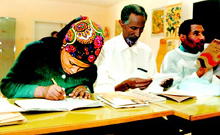Task theme: Writing a
summary
In
writing a summary, the writer takes the "main meat" of the
original piece, leaving out any descriptive details, examples, or
direct quotes. Writers of summaries never include their own personal
opinions, responses, or recommendations concerning the subject of
the summary. Summary writing is like the ideal of
journalistic reporting, which aspires to present only the main facts
and issues in concise form.
Read the article below (reprinted from 'UNworks.org' web site) on
Therese Nougbognonham, a northern Benin shopkeeper, who benefitted
from the UN Capital Development Fund's micro-credit Programme. Then
read the summary that follows, noticing the difference between the
two pieces
Original Article:
Like
any business owner, Thérèse Nougbognonhoun wanted to expand, but
lacked the capital to build up her inventory and attract new
customers for her small shop in the central market of Nikki, a town
in northern Benin.
Although
loan sharks offered Thérèse outrageous interest rates, she knew that
borrowing from them would eat up all her profits in repayments. When
a small non-profit microfinance institution called FECECAM came to town, offering loans at a very favourable rate, Thérèse saw
an opportunity to grow her business.
Thérèse
started small, but it was enough to get her going. With a loan
equivalent to only about US$30, she was able to stock her shop,
which sells vegetables, groceries and toiletries to her loyal
customers. From the sales of her expanded inventory, she supported
herself, and paid back the loan in less than six months. She then
took a slightly larger loan, paid it off quickly and is now on a
third. Thérèse is proud of the way her business is growing
steadily.
While
Thérèse may not have an MBA, she does have a business plan. She
knows her customers and what sells. And now, thanks to the
availability of affordable credit, she's achieving her goals. "I
paid each loan off before its due date," she says proudly. "Each
loan enabled me to build more and more capital, so that now I can
sell a variety of products at my stall."
The
United Nations Capital Development Fund (UNCDF) believes that lending small
sums to poor people to set up or expand small businesses is an
effective way to fight poverty. The Fund supports microfinance
institutions (MFIs) so they can extend services to entrepreneurs who
do not qualify for loans. In most cases, small-scale business people
cannot borrow from commercial banks because they lack collateral.
Without access to an MFI, unscrupulous loan sharks, which lend
without security, are often the only option.
UNCDF
works with MFIs on a range of financial services so small-scale
entrepreneurs like Thérèse can build assets, mitigate risk, and
reduce their vulnerability. UNCDF's backing of microfinance
institutions ensures their longevity far beyond the scope of United
Nations assistance.
Benin,
where Thérèse lives, is one of the world's poorest countries. The
Third UN Conference on Least Developed Countries is addressing
economic isolation and extreme poverty of the more than 650 million
people who live on less than one dollar a day.
Thérèse
has experienced first-hand the advantages of being given a chance.
"In the market, there are a lot of opportunities, but if you don't
have capital, you cannot take advantage of them. When you are poor,
even if you have good ideas you don't have any resources and cannot
start a small business."
Thérèse
is ready to work hard and to assume the responsibilities of paying
back the loans. "The possibility of having credit allows one to
climb out of one's problems," she says. "But you also have to
remember the importance of taking the reimbursement seriously,
otherwise you will lose everything and take others down with
you." |
Summary
The article tells the story of Therese Nougbognonhom,
a northeren Benin general store owner who was able to expand her
small business with the aid of the UN Capital Development Fund's
micro-credit programme. Without the help of UNCDF, Therese and other
small busness owners like her would be at the mercy of loan
sharks.
With a UNCDF loan of $30., Therese was able to expand
her inventory and also pay back the loan within six months. After
that time, she was awarded two more loans to allow continued
development of her shop. |
After reading both pieces, ask
yourself this question:
Which information on the longer
piece has been left out of the summary?
Go to PART 2 of Writing Exercise
|





